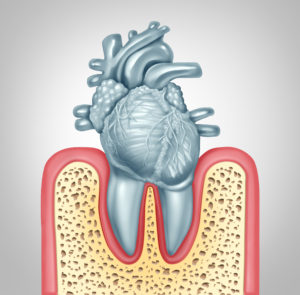
When you don’t take adequate care of your teeth and gums, you can end up with excess bacterial growth and plaque buildup that leads to gum disease. It starts as gingivitis, or the gum inflammation that is the earliest stage of gum disease, and can progress to periodontitis, which puts the health of your teeth at risk. Even more disconcerting is that gum disease is not only a risk to your oral health, but the correlation between oral health and heart disease means gum disease could lead to cardiovascular problems. Want to make sure that gum disease and heart disease don’t become a problem for you? Take good care of your teeth and gums.
What Are the Signs of Gum Disease?
Knowing the signs of gum disease allows you to understand when you need to seek help from your dentist. Watch out for these signs of gum disease:
- Swollen, red, or tender gums
- Bleeding gums during or after brushing
- Pus between teeth and gums
- Receding gums
- Pockets between teeth and gums
- Bad breath
- Hard brown deposits or buildup along the gum line
- Loose teeth
- Teeth that are moving apart
- Changes in your bite or the way any dental appliances fit
So, when should you be concerned about any signs of gum disease? Ideally, you’ll take any and all signs seriously, but it can also be helpful to understand how gum disease progresses, so you know just how severe your situation may be. No matter what, any signs of gum disease should be addressed with your dentist, as some signs may indicate a serious situation.
How Gum Disease Progresses and Impacts Your Oral Health
In most cases, gum disease starts with some mild symptoms of gum irritation due to insufficient oral hygiene. When bacteria and plaque build up along the gums, you may first notice that your gums bleed during brushing. This may be followed by swollen, red, tender, and bleeding gums, which you may notice even when you’re not brushing. At this point, your gums are irritated. However, your teeth have not yet been affected by this irritation, so the gum disease is still reversible with diligent oral hygiene or professional cleaning.
Unfortunately, if you continue to be overly lax in your dental hygiene habits, bacteria and plaque continue to build up along and under the gum line. You may start to experience tooth decay as the acids released by the bacteria attack your enamel, and the sticky plaque will begin to harden into tartar. Tartar can’t be brushed away and must be removed by your dentist, making it harder for you to clean your teeth and gums properly on your own. Your gums then become further irritated by bacteria and plaque buildup.
As gum disease progresses, your irritated gums begin to pull away from your teeth. This forms pockets that open up to collect food, plaque, and bacteria and eventually become infected. When that infection takes hold, the bone and connective tissues that hold your teeth in place can begin to break down. Your teeth can become loose and, eventually, you could lose your teeth. As though these consequences were not already severe enough, gum disease is linked to heart disease, too. In fact, the correlation between oral health and heart disease means that people with gum disease have 2-3 times the risk of having a heart attack, stroke, or other serious cardiovascular events.
The Correlation Between Oral Health and Heart Disease
There is a clear link between gum disease and heart health. In his book, If Your Mouth Could Talk, Dr. Kami Hoss notes that studies have shown a variety of negative health consequences of poor oral health and gum disease. He quotes one study showing that people with poor oral health are 4.3% more likely to suffer from cardiovascular disease. Additionally, he notes that people with periodontal disease are 19 percent more likely to experience cardiovascular disease. Gum disease causes inflammation in the mouth, but that inflammation can eventually spread to other parts of the body. Moreover, when inflammation in your body is chronic, or long-term, it becomes a contributor to many different health problems. Chronic inflammation is also a key factor in heart disease characterized by, you guessed it, plaque buildup.
Of course, the fatty plaque that builds up in your arteries is quite different from the plaque in your mouth, but they both cause significant problems for your health. The goal, then, is avoiding plaque buildup of any kind, as well as long-term inflammation anywhere in your body. And, since oral health and heart disease are linked, starting with your oral health is an excellent way to help ensure that you can maintain whole body health.
Fighting Gum Disease and Heart Disease With Oral Hygiene
If you want to prevent periodontal disease and heart disease, you can start by improving your oral hygiene habits. Always brush your teeth twice per day, for two full minutes, using a dentist-recommended toothpaste. Also, floss at least once daily to help sweep away food debris, bacteria, and sticky film that eventually lead to plaque buildup and gingivitis.
In addition, seeing your dentist every six months for a thorough cleaning helps to get rid of plaque you may have missed and tartar that builds up. Since your dentist can clearly see any areas you’re accidentally neglecting, they can give you tips on how to better reach certain areas of your teeth or gums. This guidance can help you ensure that you’re doing everything you can to keep your teeth and gums healthy. If you or your dentist notice signs of gingivitis or gum disease, you may need to improve your dental care habits or see your dentist more often until your gums are healthy again. Remember, you may not notice the earliest signs of gum disease, but it’s important to do what you can to fight this disease as soon as possible.
Oral Health and Heart Disease: The Whole Body Connection
The correlation between oral health and heart disease illustrates that preventing gum disease is important for oral health. What’s more, it also plays a significant role in helping to preserve your overall health. With excellent oral hygiene, regular oral care from your dentist, and healthy foods that prevent heart disease—and are better for your teeth)—you could stop both gum disease and heart disease before they start. Even better, you could improve the health of your whole body in the process.
To find out more about how your oral health is connected to your whole-body health, reserve your copy of If Your Mouth Could Talk today. Written by renowned dental expert, dentist, and dad Dr. Kami Hoss, this book is the culmination of over 25 years of research into the connection between oral and overall health. Discover how taking care of your mouth could help you begin a road to a longer, healthier future.
Frequently Asked Questions: Gum Disease and Heart Health
How do I know if I have periodontal problems?
If you have healthy gums, they will look pale pink and snug around your teeth, with no bleeding during brushing or flossing. They will also feel firm to the touch without any unpleasant sensations, tastes, or smells. However, unhealthy gums are different. Periodontal problems can present in a number of different ways, including:
- Gums that are swollen or puffy, tender, or bleed easily
- Gums that are bright or dark red or purple
- Gums that gap or pull away from your teeth
- Loose teeth or a change in your bite or alignment
- Bleeding with brushing and flossing
- Pain when chewing
- Bad breath
- Pus between your teeth and gums
Can this lead to tooth loss?
Unfortunately, periodontal problems can lead to tooth loss in its advanced stages. Periodontitis causes both tissue and bone loss, which can cause loose teeth or even cause them to fall out. As such, it’s essential not to ignore signs of periodontal problems and see your dentist right away for appropriate treatment. Depending on the severity of your periodontitis, timely treatment could save your teeth.
What can I do to avoid gum problems?
The best thing you can do to avoid gum problems is to take excellent care of your teeth! You should brush your teeth twice per day, for two minutes each time, using proper technique. You should also ensure that you’re using the right type of toothbrush, which you replace every three months. Additionally, use a dentist-recommended toothpaste to get the most protection. You should also floss your teeth once daily (before brushing!), using the correct technique to scrape away plaque. From there, it’s also essential that you see your dentist regularly. If your teeth and gums are healthy, you will probably schedule your dentist visits every six months. If you have periodontal problems, you may need to see your dentist for professional cleanings every three or four months.
You may also need to make other changes, including changing your diet, quitting smoking, reducing stress, and seeking interventions for grinding or clenching. The great news is that all of these things will help improve your gum health, but they’ll also improve your overall health, too.
Can gum disease cause irregular heartbeat?
While gum disease isn’t a direct cause of an irregular heartbeat, there is a link between the two. Studies have found that the inflammation caused by gum disease is a risk factor for atrial fibrillation, or an abnormal irregular heart rhythm. That means that gingivitis, periodontitis, and other oral inflammation or infections could ultimately lead to an irregular heartbeat. This is serious, as atrial fibrillation is a risk factor for dementia, heart failure, and stroke. As such, taking care of your oral health also helps ensure better overall health. Oral health and heart disease are connected, so taking good care of your mouth helps protect your heart, too. Even changing your diet to benefit your oral health often means including more foods that prevent heart disease as well.
Sources:
Dr. Kami Hoss, If Your Mouth Could Talk, pg 152
https://www.mayoclinic.org/diseases-conditions/periodontitis/symptoms-causes/syc-20354473
https://www.ncbi.nlm.nih.gov/pmc/articles/PMC6164509/
https://www.health.harvard.edu/heart-health/gum-disease-and-heart-disease-the-common-thread
https://www.healthline.com/health/gum-disease-and-heart-disease
https://www.webmd.com/oral-health/guide/gingivitis-periodontal-disease

